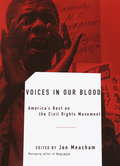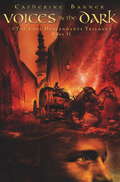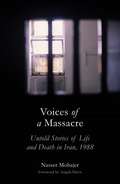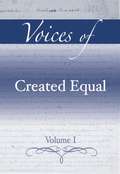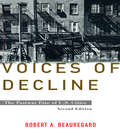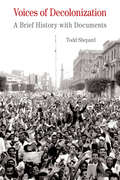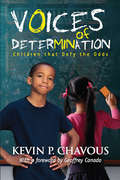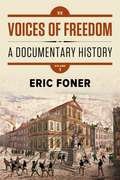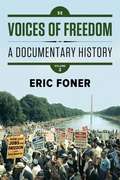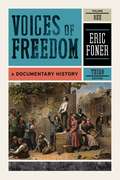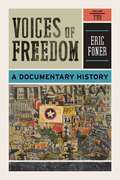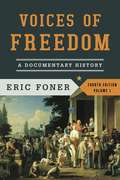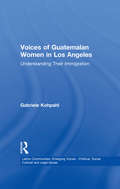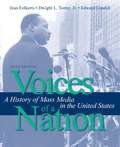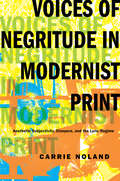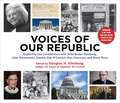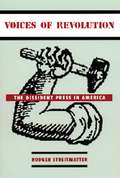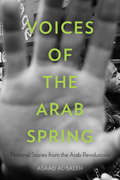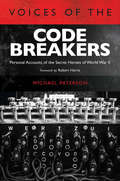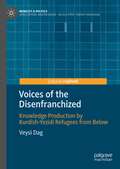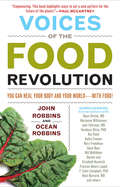- Table View
- List View
Voices in Our Blood: America's Best on the Civil Rights Movement
by Jon MeachamVoices in Our Blood is a literary anthology of the most important and artful interpretations of the civil rights movement, past and present. It showcases what forty of the nation's best writers -- including Maya Angelou, James Baldwin, Ralph Ellison, William Faulkner, John Steinbeck, Alice Walker, Robert Penn Warren, Eudora Welty, and Richard Wright -- had to say about the central domestic drama of the American Century. Editor Jon Meacham has chosen pieces by journalists, novelists, historians, and artists, bringing together a wide range of black and white perspectives and experiences. The result is an unprecedented and powerful portrait of the movement's spirit and struggle, told through voices that resonate with passion and strength. Maya Angelou takes us on a poignant journey back to her childhood in the Arkansas of the 1930s. On the front page of The New York Times, James Reston marks the movement's apex as he describes what it was like to watch Martin Luther King, Jr., deliver his heralded "I Have a Dream" speech in real time. Alice Walker takes up the movement's progress a decade later in her article"Choosing to Stay at Home: Ten Years After the March on Washington. "And John Lewis chronicles the unimaginable courage of the ordinary African Americans who challenged the prevailing order, paid for it in blood and tears, and justly triumphed. Voices in Our Blood is a compelling look at the movement as it actually happened, from the days leading up to World War II to the anxieties and ambiguities of this new century. The story of race in America is a never-ending one, and Voices in Our Blood tells us how we got this far--and how far we still have to go to reach the Promised Land.
Voices in the Dark: The Last Descendants Trilogy - Book II
by Catherine BannerAsking for the truth can be as painful as telling it. . . . Anselm Andros has clearly defined roles in his family and they are roles he plays very well—he is confidante to his mother, Maria. He is the confessor to his stepfather, Leo, a man haunted by the secrets of his past. And Anselm is also the patient, caring brother to his precocious sister, Jasmine. When the political landscape of Malonia starts to shift, this unassuming family begins to unravel. Even though they’ve spent the past fifteen years leading a quiet life, Maria and Leo’s actions are forever linked to the turbulent history of Malonia and its parallel world, modern-day England. With so much uncertainty at home and in his world, it is more important than ever for Anselm to put all the pieces of the past together. He must listen to his own voice and acknowledge his fears and desires—whatever the cost.
Voices of a Massacre: Untold Stories of Life and Death in Iran, 1988
by Nasser MohajerIn July 1988, the Islamic Republic of Iran agreed to bring an end to the brutal eight-year war with Iraq. Over the next two months, under the orders of Supreme Leader Ayatollah Khomeini, political prisoners around the country were secretly brought before a tribunal panel that would later become known as the death commission. They were not told what was happening and did not know that one &‘wrong&’ answer concerning their faith or political affiliation would send them straight to the gallows. Thousands of men and women were condemned to death, many buried in mass graves in Khavaran Cemetery in the vicinity of Tehran. Through eyewitness accounts of survivors, research by scholars and memories of children and spouses of the deceased, Voices of a Massacre reconstructs the events of that bloody summer. Over thirty years later, the Iranian government has still not officially acknowledged that they ever took place.
Voices of Color
by Nellie Wong Yolanda AlanizThis inclusive, passionate collection of essays is a compilation of 14 years of writings on a rich array of subjects by activists of color in the Freedom Socialist Party and Radical Women. Included are articles on bilingualism, sports, racism, and other important issues. Each article provides a measure of historical insight, analysis, and motivation that critically questions the multitude of issues affecting us all in a racist, for-profit society. The result is a book that stimulates the kind of thought and discussion which form the basis for commitment and action. Includes photos.
Voices of Created Equal, Volume 1
by Michael Boezi* Pedagogical aids and apparatus are designed to help students read and interpret primary sources and use the documents in the collection to gain a broader understanding of the nation's past and the diverse people who created it. * Chapter introductions present the broad outlines of the historical era addressed by the documents. Each selection begins with an introductory headnote that identifies the author of the piece and places the document within its historical context. * Questions at the end of each excerpt test students' comprehension of the selection. * Questions at the end of each chapter invite comparisons, contrasts, analysis, and reflection as they probe students' deeper understanding of the documents and the period of American history that they illuminate. * Split between two volumes, this chronological text is conveniently tailored to match the split volumes of the survey text it accompanies. * Selections in this volume include both classic and unusual documents which give life and detail to a specific section of American history. http://www.ablongman.com/catalog/academic/product/0,1144,0321395913-FEA,00.html
Voices of Decline: The Postwar Fate of US Cities
by Robert A. Beauregard[FOR HISTORY CATALOGS]Drawing on the pronouncements of public commentators, this book portrays the 20th century history of U.S. cities, focusing specifically on how commentators crafted a discourse of urban decline and prosperity peculiar to the post-World War II era. The efforts of these commentators spoke to the foundational ambivalence Americans have toward their cities and, in turn, shaped the choices Americans made as they created and negotiated the country's changing urban landscape. [FOR GEOG/URBAN CATALOGS]Freely crossing disciplinary boundaries, this book uses the words of those who witnessed the cities' distress to portray the postwar discourse on urban decline in the United States. Up-dated and substantially re-written in stronger historical terms, this new edition explores how public debates about the fate of cities drew from and contributed to the choices made by households, investors, and governments as they created and negotiated America's changing urban landscape.
Voices of Decolonization: A Brief History With Documents (The Bedford Series in History and Culture)
by Todd ShepardExploring decolonization as both a historical era and an aspirational movement, Voices of Decolonization shows how and why mid-twentieth-century decolonization transformed societies and cultures and continues to shape the world today.
Voices of Determination: Children That Defy the Odds
by Kevin ChavousVoices of Determination tells the stories of ten children who overcame extraordinarily difficult circumstances to get an education and end the cycle of generational poverty. It debunks the myth that children are victims of circumstance. In this moving work, Kevin P. Chavous argues that children can and will succeed if the educational system provides them with the opportunity to learn.Many of these narratives depict public schools at their worst. Chavous argues that poor communities routinely hire inexperienced teachers, lack resources, and pass kids along until they drop out. Once out of school, these youngsters quickly find out that they are unprepared for the job market. This, he claims, leads many young people to drift into anti-social behavior and turn to gangs, drugs, and unproductive lifestyles. In addition the narratives in this volume also address such social issues as immigration, bad neighborhoods, poor health care, addiction, and child abuse. Chavous highlights how hope for a better future enabled the children whose stories make up this volume to achieve a better life.There are potential challenges at every stage of a child's development and the adults around them need to be nearby and ready to act effectively. Chavous concludes that the need to strengthen families and to rebuild surrounding communities should be the top priorities for society as a whole.
Voices Of Freedom: A Documentary History Vol. 1 (Fifth Edition)
by Eric FonerVoices of Freedom: A Documentary History is the only reader with a thematic focus on American freedom in its many dimensions. The organization of this compact, unintimidating collection of primary source documents mirrors that of the enormously successful Give Me Liberty! family of U. S. survey texts, and has been fully updated to match the Fifth Edition.
Voices of Freedom: A Documentary History, Volume 2
by Eric FonerVoices of Freedom: A Documentary History is the only reader with a thematic focus on American freedom in its many dimensions. The organization of this compact, unintimidating collection of primary source documents mirrors that of the enormously successful Give Me Liberty! family of U.S. survey texts, and has been fully updated to match the Fifth Edition. Affordable and an exceptional value when packaged with Give Me Liberty!, Voices of Freedom is now available for the first time in an alternative ebook format.
Voices of Freedom: A Documentary History, Volume 1 (3rd Edition)
by Eric FonerWritten as a companion to Foner's (history, Columbia U.) well-regarded American history survey textbook Give Me Liberty! this collection of 98 primary source documents reflects the fluid nature of definitions of freedom. Selections, some of which are excerpts, others reproduced in their entirety, span over 300 years of American history from the age of European exploration to Reconstruction. Organized chronologically, each document is preceded by a short introduction and followed by two study questions. Authors include Adam Smith, Noah Webster, Thomas Jefferson, fugitive slave Joseph Taper, Elizabeth Cady Stanton, Robert Owen, Pontiac, and James Winthrop among others. This third edition has a new global focus and contains more than 40 documents not featured in earlier editions. The work has not been indexed. Annotation ©2011 Book News, Inc., Portland, OR (booknews.com)
Voices of Freedom: A Documentary History, Volume 2 (3rd Edition)
by Eric FonerThe Third Edition of Voices of Freedom includes documents reflecting the global dimension of American history and remains a comprehensive collection that offers a diverse gathering of authors and a wide breadth of opinion.
Voices Of Freedom: A Documentary History, Volume 1 (Fourth Edition)
by Eric FonerA rich collection of documentary voices addressing a central theme in American history--freedom. The documents in this collection show that although in some ways universal, the idea of freedom has never been a fixed, timeless concept with a single, unchanging definition. In fact, the history of the United States is in part a story of debates and struggles over freedom. Crises like the American Revolution, the Civil War, and the Cold War have permanently transformed the meaning of freedom. So too have demands by various groups of Americans for greater freedom. The primary-source selections in this book include presidential proclamations and letters by runaway slaves, famous court cases and obscure manifestos, prevailing ideas and dissenting ones. The voices range from Las Casas and Pontiac through Jefferson, Thoreau, Douglass, and Lincoln to Stanton, Sanger, Garvey, Luce, Byrd, and Obama. The Fourth Edition of Voices of Freedom includes new documents that better reflect the religious aspects of American history. It remains a comprehensive collection that offers a diverse gathering of authors and a wide breadth of opinion. Fully compiled and edited by Eric Foner, the collection includes headnotes and critical questions for each document. The book is organized as a companion to the textbook Give Me Liberty! An American History, Fourth Edition, by Eric Foner, and it can also be used with other texts in the American history survey and other courses.
Voices of Guatemalan Women in Los Angeles: Understanding Their Immigration (Latino Communities: Emerging Voices - Political, Social, Cultural and Legal Issues)
by Gabriele KohpahlFirst published in 1999. Guatemalan immigration is part of a trend where more women in an increasing number of countries than men participate in transnational migration. This research attempts to clarify the causes for this phenomenon. First, it evaluates which Guatemalan women initiators and pioneers in the decision to migrate. Second, it looks at women's diverse reasons for leaving Guatemala, and third, what are the conditions particular to women left behind? This study will also contribute to an understanding of the increasing diversification of the Latin American immigrant population in the United States.
Voices Of A Nation: A History Of Mass Media In The United States
by Jean Folkerts Dwight Teeter Edward CaudillVoices of a Nation: A History of Mass Media in the United States presents a cultural interpretation of the history of both traditional and nontraditional media, emphasizing that minority as well as mainstream media have impacted American history. Voices of a Nation sets media history in the context of overall historical events and themes and tries to understand the role of media in a democratic society at varied historical points. Organized chronologically, the text recognizes the significant “voices” of such non-traditional media as suffrage newspapers, ethnic newspapers, and cultural movement papers and magazines.
Voices of Negritude in Modernist Print: Aesthetic Subjectivity, Diaspora, and the Lyric Regime (Modernist Latitudes)
by Carrie NolandCarrie Noland approaches Negritude as an experimental, text-based poetic movement developed by diasporic authors of African descent through the means of modernist print culture. Engaging primarily the works of Aimé Césaire and Léon-Gontran Damas, Noland shows how the demands of print culture alter the personal voice of each author, transforming an empirical subjectivity into a hybrid, textual entity that she names, after Theodor Adorno, an "aesthetic subjectivity." This aesthetic subjectivity, transmitted by the words on the page, must be actualized—performed, reiterated, and created anew—by each reader, at each occasion of reading. Lyric writing and lyric reading therefore attenuate the link between author and phenomenalized voice. Yet the Negritude poem insists upon its connection to lived experience even as it emphasizes its printed form. Ironically, a purely formalist reading would have to ignore the ways formal—and not merely thematic—elements point toward the poem's own conditions of emergence. Blending archival research on the historical context of Negritude with theories of the lyric "voice," Noland argues that Negritude poems present a challenge to both form-based (deconstructive) theories and identity-based theories of poetic representation. Through close readings, she reveals that the racialization of the author places pressure on a lyric regime of interpretation, obliging us to reconceptualize the relation of author to text in poetries of the first person.
Voices of Negritude in Modernist Print
by Carrie NolandApproaches Negritude as an experimental, text-based poetic movement developed by diasporic authors of African descent through the means of modernist print culture
Voices of Our Republic: Exploring the Constitution with Ruth Bader Ginsburg, Alan Dershowitz, Sandra Day O'Connor, Ron Chernow, and Many More
by Douglas GinsburgThis inspiring coffee table book serves as a companion to the three-part 2020 PBS series A More or Less Perfect Union, A Personal Exploration by Judge Douglas Ginsburg, which delves into past, present, and future struggles for liberty through the lens of the US Constitution. Voices of Our Republic features thoughts about the Constitution from personalities, dignitaries, and everyday heroes, including Justice Ruth Bader Ginsburg, Arthur Sulzberger, Alan Dershowitz, Sandra Day O’Connor, Arnold Schwarzenegger, Joseph Ellis, Jack Nicklaus, Gene Simmons, Ron Chernow, and many others. These figures help answer the question of why the Constitution is so important and how it can be applied to political discourse today. Each person emphasizes a different part of the Constitution―from the Bill of Rights to the 19th Amendment and beyond―and why those particular passages are important. Complete with more than 75 full-color photos―many from the private collections of the contributors―this book makes the perfect gift for every American, regardless of political affiliation. Voices of Our Republic serves as a key resource for those looking to better appreciate the foundation of American government and to increase our understanding of its application during its initial creation and still today.
Voices of Revolution: The Dissident Press in America
by Rodger StreitmatterStreitmatter tells the stories of dissident American publications and press movements of the last two centuries, and of the colorful individuals behind them. From publications that fought for the disenfranchised to those that promoted social reform, Voices of Revolution examines the abolitionist and labor press, black power publications of the 1960s, the crusade against the barbarism of lynching, the women's movement, and antiwar journals. Streitmatter also discusses gay and lesbian publications, contemporary on-line journals, and counterculture papers like The Kudzu and The Berkeley Barb that flourished in the 1960s. Voices of Revolution also identifies and discusses some of the distinctive characteristics shared by the genres of the dissident press that rose to prominence—from the early nineteenth century to the late twentieth century. For far too long, mainstream journalists and even some media scholars have viewed radical, leftist, or progressive periodicals in America as "rags edited by crackpots." However, many of these dissident presses have shaped the way Americans think about social and political issues.
Voices of South Africa: Growing Up in a Troubled Land
by Carolyn MeyerThe author recounts her visit to South Africa where she interviewed numerous young people, both black and white, to find out what growing up is like in a country torn apart by racial strife.
Voices of the Arab Spring: Personal Stories from the Arab Revolutions
by Asaad AlsalehNarrated by dozens of activists and everyday individuals, this book documents the unprecedented events that led to the collapse of dictatorial regimes in Tunisia, Egypt, Libya, and Yemen. Beginning in 2011, these stories offer unique access to the message that inspired citizens to act, their experiences during revolt, and the lessons they learned from some of the most dramatic changes and appalling events to occur in the history of the Arab world. The riveting, revealing, and sometimes heartbreaking stories in this volume also include voices from Syria. Featuring participants from a variety of social and educational backgrounds and political commitments, these personal stories of action represent the Arab Spring's united and broad social movements, collective identities, and youthful character. For years, the volume's participants lived under regimes that brutally suppressed free expression and protest. Their testimony speaks to the multifaceted emotional, psychological, and cultural factors that motivated citizens to join together to struggle against their oppressors.
Voices of the Codebreakers: Personal Accounts of the Secret Heroes of World War II
by Michael PatersonAlongside the open conflict of World War II there were other, hidden wars - the wars of communication, in which success depended on a flow of concealed and closely guarded information.Smuggled written messages, secretly transmitted wireless signals, or months of eavesdropping on radio traffic meant operatives could discover in advance what the enemy intended to do. This information was passed on to those who commanded the armies, the fleets and the bomber formations, as well as to the other secret agents throughout the world who were desperately trying to infiltrate enemy lines. Vital information that turned the tide of battle in North African desert and on the Pacific Ocean proved to have been obtained by the time-consuming and unglamorous work of cryptanalysts who deciphered the enemy's coded messages, and coded those for the Allies.From the stuffy huts of Bletchley Park to the battles in the Mediterranean, the French and Dutch Resistance movements and the unkempt radio operatives in Burma, the rarely-seen, outstanding stories collected here reveal the true extent of the 'secret war'.The ongoing need for secrecy for decades after the war meant that the outstanding achievements of wartime cryptanalysts could not be properly recognised.With vivid first-hand accounts and illuminating historical research, VOICES OF THE CODEBREAKERS reveals and finally celebrates the extraordinary accomplishments of these ordinary men and women.
Voices of the Disenfranchized: Knowledge Production by Kurdish-Yezidi Refugees from Below (Mobility & Politics)
by Veysi DagOver a million Kurdish-Yezidi refugees are dispersed across European cities and towns. However, they are neither recognized as a distinct community of stateless immigrants nor as a distinct European ethnic or religious minority. They are frequently utilized as data sources without having a voice to address their challenges. This oral testimony project, moving beyond, but contributing to, conventional academic research, provides these communities with a space to tackle multiple questions in their own languages and with their own voices. The book seeks to answer what drives their departures from their home countries, how they escape, what shapes their lives in receiving cities, and finally, how homeland affairs influence their lives in new environments. By addressing all these themes, this book presents refugee-centric knowledge by and with refugees as objects and subjects of their narratives and transcends neoliberal humanitarian, state-centric, and colonial hegemonic epistemes that limit refugees' epistemic capabilities and viewpoints.
Voices of the Food Revolution: You Can Heal Your Body and Your World—with Food!
by John Robbins Ocean RobbinsConversations about the power of plant-based diets with Bill McKibben, Marianne Williamson, Neal Barnard, and others: &“Empowering.&” —Paul McCartney In this book, the bestselling author of the &“groundbreaking&” Diet for a New America (Mark Bittman, The New York Times), John Robbins, in collaboration with his daughter, presents a collection of interviews with prominent figures exploring the connections among diet, physical health, animal welfare, world hunger, and environmental issues.With the inclusion of resources and practical suggestions to help you revolutionize your own eating habits and make a difference, this book features conversations with Dean Ornish, MD; Raj Patel; Morgan Spurlock; Vandana Shiva; Frances Moore Lappe; and others.
